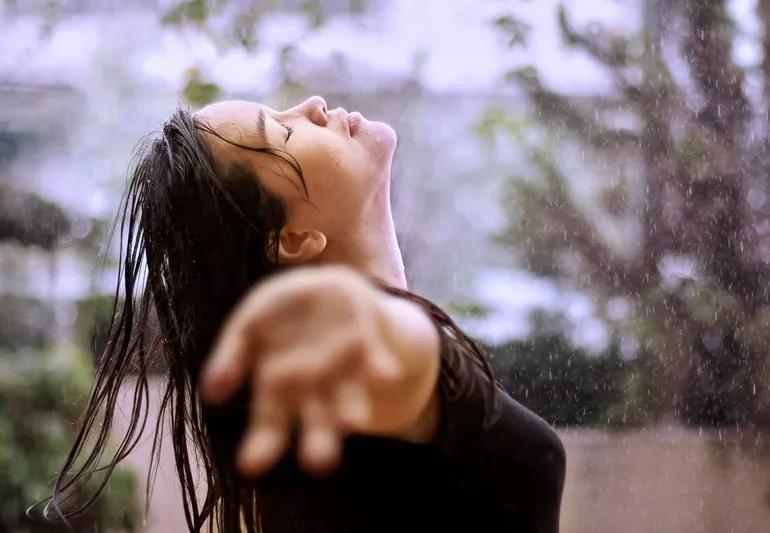Here’s what damp tresses can actually do to you

Image content: This image is available to view online.
View image online (https://assets.clevelandclinic.org/transform/ac94cdf9-2af7-43ce-9aff-3d58a689913d/wmnWetHairRain-147057605-770x533-1_jpg)
woman with wet hair outside during rainstorm
If you have long hair, you’ve probably experienced the aggravation of running out of time to dry it before you head outside or fall into bed.
Advertisement
Cleveland Clinic is a non-profit academic medical center. Advertising on our site helps support our mission. We do not endorse non-Cleveland Clinic products or services. Policy
But was your grandma right about the risks? Wet hair can be annoying, sure, but is it actually dangerous?
Family medicine specialist Matthew Goldman, MD, talks about the potential hazards of wet hair — including a concern you may not have considered.
Children have heard the warnings since the beginning of time: “Don’t go out in the cold with wet hair, or you’ll catch pneumonia!” But with apologies to grandma (she has so much other wisdom to share), this one isn’t true.
You cannot get sick from simply going outside with wet hair.
“Hair being wet is not the cause for catching a cold,” Dr. Goldman says. “A microorganism, such as a virus, has to be involved to cause a cold.”
Still, he explains, there is some logic to the old warning:
“Colder air temperatures are better environments for viruses, such as the rhinovirus (the most common cause for the common cold), to travel through the air. There is some research to suggest that the lack of sun and vitamin D during the winter may also play a role in a weakened immune system or a diminished ability to mount a response to an infection.”
He adds that when people congregate indoors to avoid extreme temperatures — including harsh cold or blistering heat — infections that are transmitted through the air tend to pass more often and more easily from one person to another.
Advertisement
That means it’s not your hair or the weather that’s making you sick. It’s gathering indoors to get away from the weather, wet hair or otherwise.
Bacteria and fungi thrive in warm, moist environments. That’s why fungal infections (think diaper rash, jock itch, athletes’ foot, etc.) are so common within the folds and crevices of your body. They’re places that tend to accumulate sweat — which is, of course, both warm and moist.
“If your hair is recurrently wet and warm, such as from sweat in a warmer climate, and it comes into contact with a microorganism, then it is more likely for infection to occur,” Dr. Goldman says.
Who among us hasn’t showered at the end of a long day and plopped into bed without drying our hair? You may never have thought twice about doing so — but Dr. Goldman lays out the possible risks.
But here’s some unsettling info: Sleeping with wet hair can increase your risk of infection. Again (noticing a pattern here?) that’s because fungi and bacteria thrive in warm, moist environments, and when you fall asleep with a wet mop, you create exactly such an environment.
“If you happen to bring fungus or bacteria (or both) home with you and deposit them onto your pillow or sheets, there is a chance they will survive and thrive,” Dr. Goldman warns. “The recurrent heat from your head on the pillow or body on the mattress and sheets, especially if your head is wet — either from bathing before bed or from overnight sweating — can lead to fungal and bacterial growth.”
Such infections can include:
Again, though, it bears repeating: It’s not wet hair itself that can make you sick. If you’ve already been exposed to a particular bacteria or fungus, though, sleeping with wet hair can create a hospitable environment for gunk to grow — which can ultimately result in infection.
Wet hair is weakened hair.
When your hair is wet, it can safely stretch up to 30% of its original length without damage. But stretching it further — as through combing, brushing and certain hairstyles — can cause irreversible changes.
You’re especially vulnerable to hair damage if you sleep with damp tresses in tight styles (think braids and buns), which can put tension on your hair and make it more susceptible to fractures. This can cause hair to:
Advertisement
This one’s easy. “Whenever possible, go to sleep with dry hair,” Dr. Goldman says.
You can further protect yourself by choosing a pillowcase that doesn’t retain moisture, like one made of silk or another moisture-wicking fabric. That way, on the (hopefully rare) occasions that you do go to sleep before blow-drying, your hair will better retain its own moisture and limit friction — which can contribute to shine, strength, fullness and overall hair health.
Advertisement

Sign up for our Health Essentials emails for expert guidance on nutrition, fitness, sleep, skin care and more.
Learn more about our editorial process.
Advertisement
Rosemary oil’s antioxidant, anti-inflammatory and antimicrobial properties could help stimulate hair growth
Scalp cancers can occur because of long-term sun exposure
Soften your skin with warm water and shaving cream before shaving with the grain of the hair
Age is the most likely reason for typical graying, but premature graying may be caused by stress, diet, smoking or autoimmune disease
Focus on nutrition, gentle styling habits and adapting to your hair type
How often you lather up your locks can depend on various factors, like hair type, age and ethnicity
Eating whole grains, salmon, fruits and vegetables can help you achieve longer, healthier locks
Your genes, ethnicity, diet and stress levels may all affect your facial hair
Although it could be used as a moisturizer, this new trend is not recommended
Communicating clear limits helps protect your time, energy and emotional well-being
High cholesterol can be genetic, but testing and treatment can lower your heart disease risk